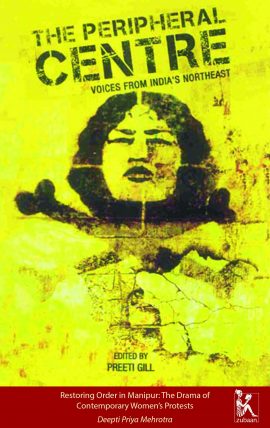No products in the cart.
Return To Shop
Log in / Sign in
Login
Register
Filter by price
Two prominent protests in Manipur by women in recent years, one an individual one and the other a collective one, have brought to national attention the brutalities committed by the armed forces on ordinary citizens under the Armed Forces Special Powers Act.
This essay highlights what those protests mean for peace in Manipur, and how women have played a critical role in exposing the impunity with which human rights are violated under the exceptional circumstances created by the AFSPA. It also questions the unethical nature of militarization and the patriarchal nature of the State.
Broadly containing two segments, it gives a background to Irom Sharmila’s protests and her reasons for choosing hunger strike as her method of protest. The discourse of conscience and Satyagraha that Sharmila evokes is brought out through interviews. This is followed by an analysis of the 2004 public disrobing by the Meira Paibis, in protest against the rape and murder of a young woman by the personnel of the Assam Rifles.
The essay shows the inversions brought about by both protests via a comparison between Irom Sharmila’s prolonged hunger strike against an exceptionally violent law, and the Indian Army Rape Us protests by the Meira Paibis. Both challenge the division between the public and the private, holding the state publicly accountable for atrocities committed in private. Food and clothing, one a biological necessity and the other an important social norm, are given up by the protestors. According to Mehrotra, this shows the power of the human body generally, and the female body particularly, to formulate and transmit subversive messages. She finds that underlying the protests is a common thread of rebuilding Manipur out of all the chaos.
Categories
Filter by
Product tags
academic
AFSPA
Bangladesh
caste
conflict
Dalit women
e-essays
feminism
feminist
feminist fiction
Fiction
gender
gender studies
health
history
impunity
India
Kashmir
legislation
Literary Fiction
Memoir
Nagaland
New Editions
Non-Fiction
Northeast India
Pakistan
Poetry
sexual violence
Short Stories
sociology
South Asia
state impunity
SVI
SVI Project
Top Ten
translation
violence
violence against women
warehouse wonders
women's activism
women writer
women writers
young zubaan
zubaanbooks
Zubaan Classics
Contact Us
© Zubaan 2019. Site Design by Avinash Kuduvalli.
Payments on this site are handled by CCAvenue.


